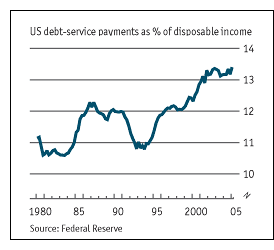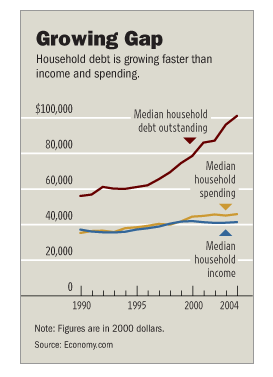

|
| weblog/wEssays | home | |
|
Unhealthy Appetites, Diseased Lifestyles (January 30, 2006)  Am I the only one who sees a connection between America's explosion of obesity
and its debt-bloated lifestyle?
According to a
forbes.com
story titled "How We Get Fat":
Am I the only one who sees a connection between America's explosion of obesity
and its debt-bloated lifestyle?
According to a
forbes.com
story titled "How We Get Fat":
Despite the fact that Center for Consumer Freedom in Washington, D.C, says that Americans spend around $50 billion every year trying to lose weight, according to the U.S. Centers for Disease Control in Atlanta, 60% of the U.S. population aged 20 and older is obese.That is an astonishing and sobering number--nearly 2/3 of America's 250 million adults are overweight and therefore at risk. As the chart shows, America's addiction to easy credit tracks our addictions to junk food and unhealthy lifestyles: despite record low interest rates, the percentage of income being paid to service debt is hitting record highs. This borrowing frenzy has created a false prosperity not unlike the false sense of well-being one feels after eating a supersized burger, fries and empty-calorie soda: it sure tastes good right now, but the damage you've done to yourself will last for years and perhaps your entire life.  As reported in the Wall Street Journal of 1/28/06 in a piece on
the falling GDP:
As reported in the Wall Street Journal of 1/28/06 in a piece on
the falling GDP:
American shoppers have been the main engine of growth for the US and the international economy the last few years. But in the process, they have been spending far more than what they earned. All told, household debt has been increasing at an annual pace of nearly 12% in the latest quarter, the fastest pace in 18 years.Sadly, there are only two ways to lose weight: eat less and exercise more by applying lifestyle change and discipline, or have your ability to eat large quantities of food surgically restricted. In a similar fashion, higher interest rates and the breaking of the housing bubble are about to restrict America's addiction to vast quantities of new debt. Evidence that the housing boom is over abounds; here is but one story of many: Contractors Cut Prices as Remodeling Boom Slows Mortgage giant Freddie Mac predicts that rates on 30-year fixed-rate mortgages will rise to 6.5% by the end of the year, up from the current 6.15%. Home-equity credit lines are tied to the prime interest rate, which is now 7.25%, up from 5.25% a year ago.Or this from Barrons "Up and Down Wall Street" column of 1/28/06: What marked the extended and powerful cycle, he reminds us, is that it was built on cheap credit and incredibly relaxed loan standards. Some 43% of first-time buyers, David recounts, put zero money down on their home purchases last year; by contrast, two years earlier, 28% bought a house with no down payment. Well over a quarter of the mortgages in '05 were of the dicey "buy now, pay later" variety. The backlog of unsold inventories in the resale housing market last month shot up 26% above the December '04 level to a 5.1 months' supply; that compares with the low of 3.8 months in January of last year. Inventory of new homes stands at its highest level in nine years. The overhang of unsold units in the condo market constitutes a formidable 6.2 months' supply. And pricing is beginning to reflect the inventory bulge: December's median price of $211,000 for an existing home was virtually unchanged from last spring and down 4% from the August peak.Will Americans be healthier once they can no longer borrow huge amounts of "free" cash on their homes, or buy homes with no money down? Undoubtedly. But the transition--call it "belt tightening," "correction," recession" or "depression", the result will be the same whatever label you apply--will be painful. Marginal borrowers will lose their homes and go bankrupt. The builders, suppliers and home furnishings industries will contract mightily, along with the wider economy they've been supporting. Nobody says losing weight is easy or fun; in a similar fashion, paying off debt or blowing it off in bankruptcy is neither easy nor fun. But the piper is about to demand payment for years of profligate borrowing, and like an obesity-caused heart attack, there will be no choice but cut, cut, cut. * * * copyright © 2006 Charles Hugh Smith. All rights reserved in all media. I would be honored if you linked this wEssay to your site, or printed a copy for your own use. * * * |
||
| weblog/wEssays | home |